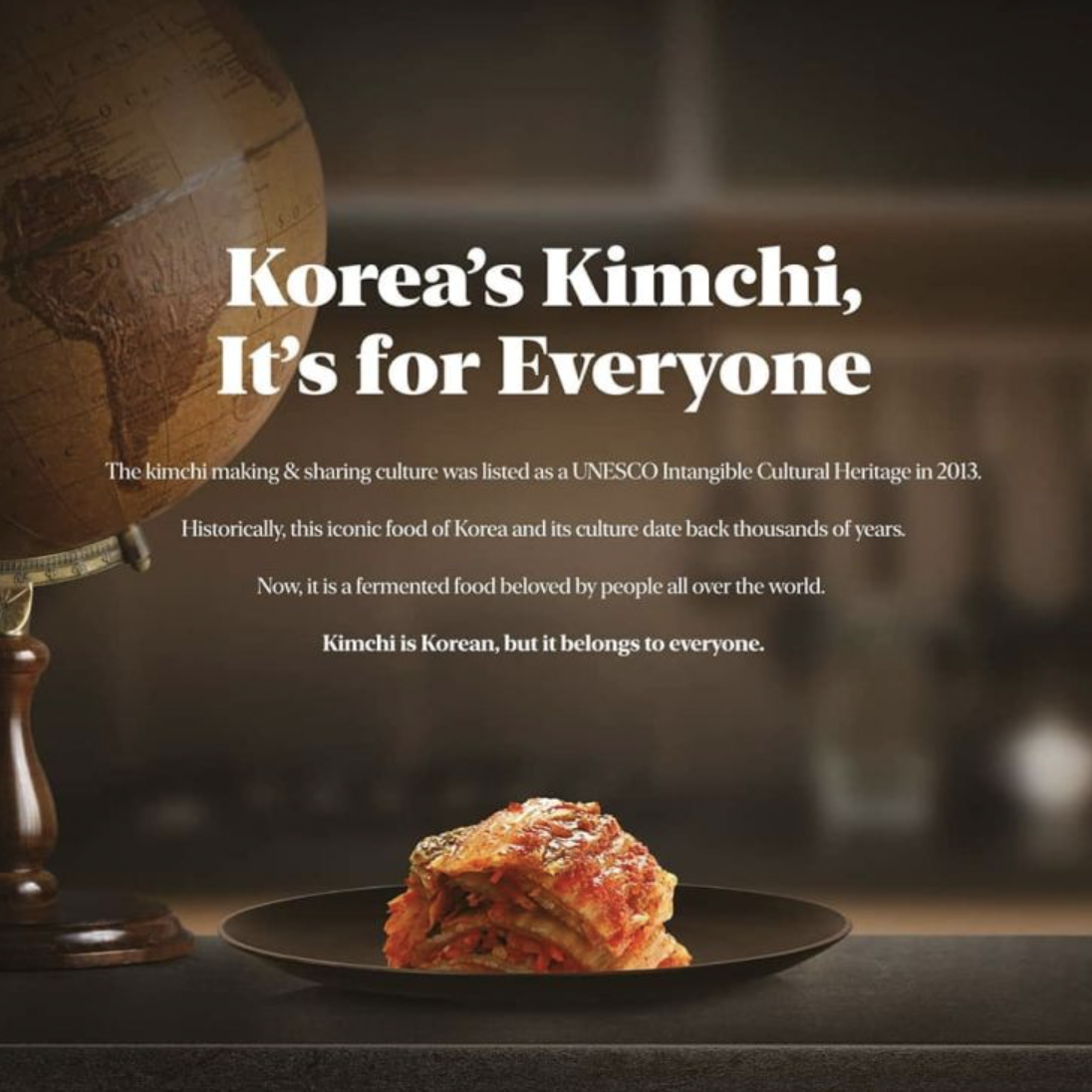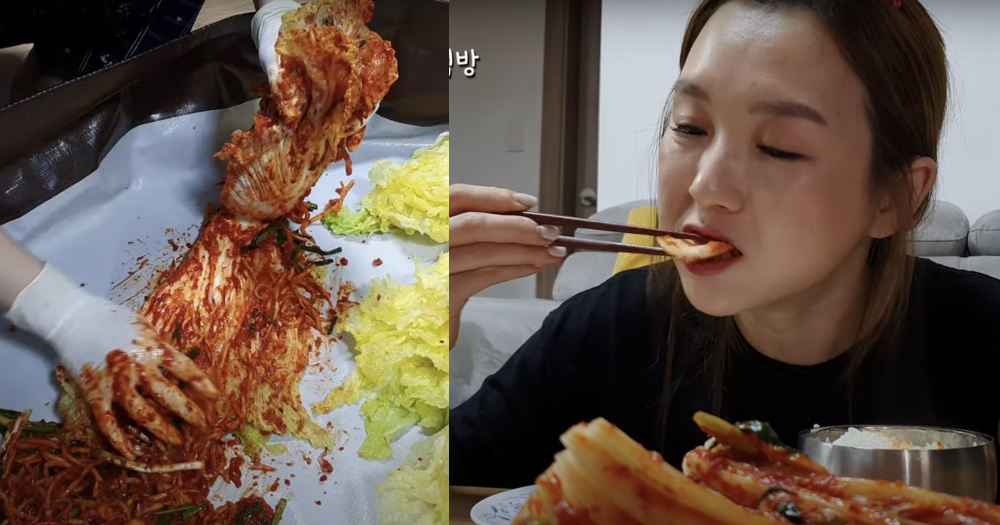Follow us on Telegram for the latest updates: https://t.me/mothershipsg
South Korean mukbang star Hamzy, who found herself in a pickle when she "liked" a comment about China claiming Korean kimchi as its own, has posted a new video where she made and ate kimchi.
Partnered with South Korean government on kimchi video
In another mukbang video she posted on Monday, Jan. 25, Hamzy, who has more than 5 million subscribers, recorded herself making kimchi, a side dish made of fermented vegetables that is eaten as a staple in Korea.
Perhaps notably, one of the hashtags she included was "#koreanfood".
In a comment she wrote, Hamzy revealed that the video was done in collaboration with the country's Ministry of Agriculture, Food and Rural Affairs as part of a campaign to promote Korean food.
Cancelled in China
The kimchi controversy was reignited on Jan. 15 when Hamzy reportedly "liked" a comment by a Korean follower that said the Chinese were claiming kimchi as their own.
The move was interpreted by her Chinese audience as being anti-Chinese, who conveyed their anger to her in their comments, and swore to boycott her.
Hamzy was then dropped by a Chinese company she was working with to distribute her videos in China.
She apologised to her Chinese fans, saying that she had "liked" the comment hastily without reading it completely as most comments are in support of her and she typically "likes" comments her viewers left her.
Her apology was unable to appease Chinese netizens, who welcomed the news of her termination of contract with her Chinese business partner.
 Screenshot via Weibo
Screenshot via Weibo
"What do you do with this sort of person if you don't drop them?"
Doubling down
In the wake of the controversy, Hamzy doubled down, writing in a post on her YouTube community page that if she has to say that kimchi is a Chinese food in order to work in China, she will not work in China".
She also clarified that her contract with the Chinese company has been terminated because of the incident, and that her YouTube channel is not owned by any company.
In a subsequent post she wrote a day later, she continued to stand her ground.
While she apologised once again for sparking the latest wave of intense online furore by liking a comment, and also for a previous video on Mapo Tofu in which she added the hashtag "#koreanfood" -- she has since changed it to "#chinesefood" -- Hamzy stuck to her guns, and said:
"Other than a group of Chinese, Koreans and most foreigners also don't think kimchi is a Chinese food.
I don't get why we're having such a needless fight. Please stop.
Koreans only said 'kimchi is a Korean food', just like how the Chinese say 'the Great Wall of China is Chinese', and how the Japanese say 'sushi is a Japanese food', it is a fact, plain and simple."
South Korean professor puts up ad on international paper
Jumping into the fray is a South Korean professor at Sungshin Women's University in Seoul, Seo Kyoung-duk, who placed an ad on the fifth page of both the U.S. and international editions of The New York Times on Jan. 18, Korea Times reported.
The ad said "Kimchi is Korean, but it belongs to everyone."
 Image via Seo Kyoung-duk/Facebook
Image via Seo Kyoung-duk/Facebook
The move was taken in response to what he called efforts by "Chinese online influencers, state-controlled news media, government officials" to pass off kimchi as something Chinese, Seo told South China Morning Post.
Seo was referring to a Jan. 3 tweet by the Chinese Ambassador to the United Nations, Zhang Jun, who posted pictures of himself with kimchi, and told his followers to "try some homemade kimchi".
Winter life can also be colorful and enjoyable. One option is to try some homemade kimchi by yourself. Not too difficult. My colleagues said it's super tasty. pic.twitter.com/I7suR4jClt
— Zhang Jun (@ChinaAmbUN) January 3, 2021
In his tweet, Zhang did not say which country invented kimchi, but South Korean netizens left comments that thanked him for liking and appreciating the Korean dish.
ISO awarded international certification for pao cai, not kimchi
This spat between Chinese and South Korean netizens over which country kimchi first originated from has lasted since November 2020.
Nationalistic state-affiliated media Global Times had reported Beijing's winning of an international certification from global industry standards body ISO for pao cai, a pickled vegetable dish from Sichuan, as "an international standard for the kimchi industry led by China".
This is in spite of the ISO listing clearly stating "this document does not apply to kimchi".
The Global Times report raised the ire of South Korean netizens, who thought China is claiming Korean culture as its own.
South Korea gets most of its kimchi from China
Kimchi in China is often called pao cai, but China also has its own pao cai, which is a pickled vegetable dish from Sichuan.
The kimchi controversy has prompted Park Jong-cheol, president of the Kimchi Association in South Korea, to comment that a Chinese name for kimchi is needed in order to avoid much misrepresentation of the food in China.
He opined that since kimchi does not have its own Chinese term, it is often referred to as pao cai in Chinese, which gives rise to misrepresentation of the Korean dish.
He also called for South Korea to "strengthen global standardisation efforts to advance the kimchi industry".
South Korea has been running a kimchi trade deficit with China since 2006 for it imports more kimchi from China than the other way around.
In 2017 alone, it imported 99 per cent of its kimchi from China, which has stringent import requirements for pickled food.
But regardless of the online spat, judging from this Google Trends graph, it appears that the Sichuanese dish pao cai has gained greater publicity worldwide due to this cultural war sparked by a dispute over the origins of kimchi.
Totally unrelated but follow and listen to our podcast here
Top image adapted via Hamzy/YouTube
If you like what you read, follow us on Facebook, Instagram, Twitter and Telegram to get the latest updates.
